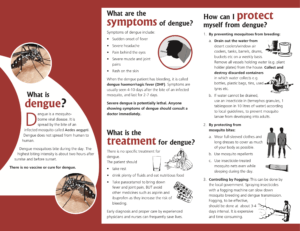
Dengue Infographic Source: http://www.searo.who.int/entity/vector_borne_tropical_diseases/topics/dengue/Dengue.pdf?ua=1
Dengue virus (DENV) transmitted by Aedes aegypti causes dengue fever (DF), dengue haemorrhagic fever (DHF) and dengue shock syndrome (DSS). DENV infection induces lifelong which is specific for the infecting serotype, and subsequent infection with a different serotype often leads to severe DHF/DSS. This severity has been suggestively attributed to antibody-dependent enhancement or T cell original sin. As a result development of DENV vaccines would have to induce immunity to all serotypes.
Dengvaxia® (CYD-TDV) developed by Sanofi-Pasteur, is a live-attenuated vaccine containing a virus backbone that expresses envelope protein (Env) from DENV1-4. The WHO Global Advisory Committee on Vaccine Safety, recommends the use of Dengvaxia® in areas of high DENV endemicity to reduce the increased risk of DHF/DSS in individuals naïve to wild DENV infection. Takeda Pharmaceutical Company Limited has also developed a DENV vaccine -TAK-003- which recently achieved its phase 3 efficacy end point. TAK-003 is a live attenuated vaccine that expresses precursor membrane (prM) and Env from DENV1-4.
A study by Waickman et al., aimed to investigate T cell responses induced by TAK-003. They showed that TAK-003 induces strong CD8 T cells (IFN-γ+CD107+) responses that last for at least 120 days. Induced cellular immunity was reactive to the entire DENV proteome and cross-reactive to all 4 serotypes. Metabolic profiling of T cells in TAK-003 vaccinees showed that CD8 T cells that had high functional and proliferative activity expressed high levels of transferrin receptor (TfR1). Upregulation of TfR1 was observed in both vaccine-specific and non-specific CD8 T cells. These results implicate the iron pathway in vaccine-induced immunity and suggest that manipulation of this pathway following vaccination could improve vaccine-induced immunity.
Journal Article: Waickman et al., 2019. Dissecting the heterogeneity of DENV vaccine-elicited cellular immunity using single-cell RNA sequencing and metabolic profiling. Nature Communications











